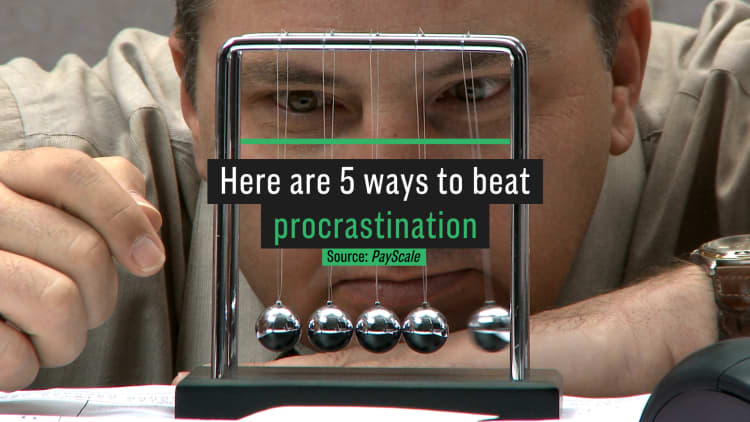Overwhelmed? Overworked? You could be a chronic procrastinator and not even know it.
Even successful people can suffer from procrastination, Christine Li, a clinical psychologist and procrastination coach, tells CNBC Make It. The desire to be a perfectionist and gather as much information as possible before making a decision can hold high-performing people back from finishing certain tasks and moving forward.
As tasks pile up, you could feel emotionally drained, physically exhausted and guilty that your work isn't progressing despite the time you're putting in. "Nobody intends to have this be a part of their identity," says Li.
If you suspect procrastination might be holding you back, here are three simple questions Li says can get you back on track.
Question #1: What's distracting me from my goals?
Consider what share of your day is taken up by distractions. Since your phone might be on the top of that list, Li suggests you take control by using a time-tracking app such as Apple's Screen Time or the Moment App to get a real handle on how much time you spend distracted by notifications and alerts on your device.
Studying the time spent in email, Slack and other platforms can help you understand if you're allowing your day to be more reactive than proactive, keeping you busy but not productive. If that's the case, give yourself permission to put your priorities and tasks first. Resist the urge to weigh in where you might not truly be needed.
Looking at the hours spent on your devices can be terrifying, she says. Still, that data can be an important signal you need to change your behavior. Facing that fear, says Li, can help you feel more in control.
Question #2: What's my biggest priority?
Get clarity on your most important tasks and reflect on why they aren't getting done. You might find you dread doing those projects. In some cases, you might simply discover you don't have the information you need.
Get comfortable asking for help, a step that can make it easier to conquer any fear of judgement or uncertainty Li says can hold some procrastinators back.
Take your focus off yourself and onto the project, seeking the advice of experts on your team who can answer key questions on complicated projects and move those forward. These colleagues might even help you assess what you can delegate.
Don't be afraid to ask yourself which tasks could be struck from your list altogether. Items that have lingered on a to-do list for weeks or months are likely not a priority and could be removed entirely.
Question #3: How can I keep moving forward?
Find ways to keep projects in motion. Keep focused on your priorities, breaking big projects into doable smaller projects to build momentum.
Take on one thing at a time, says Li. When you finish something, congratulate yourself on the progress you've made.
Remember, she says: procrastination is a learned behavior. Keep moving, knowing that with every completed task you're building new healthy habits that will set you up for success.
Like this story? Subscribe to CNBC Make It on YouTube!
Don't miss:


